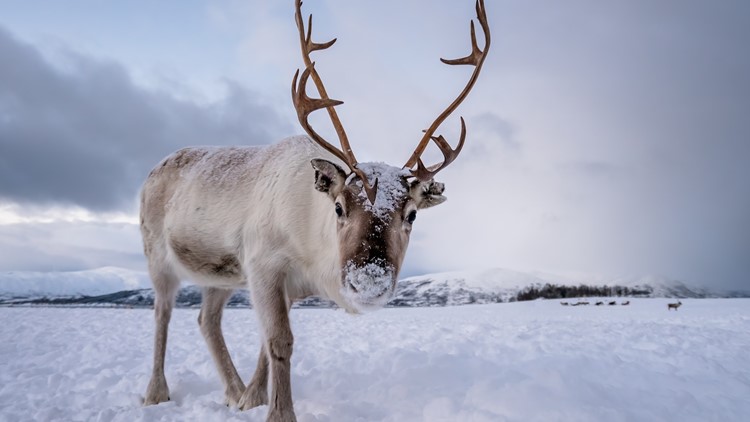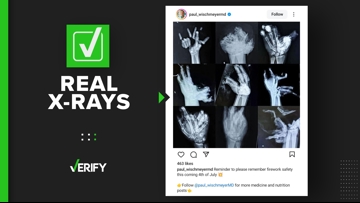Every year on Christmas Eve, nine reindeer pull Santa’s sleigh through the sky so he can deliver presents to children throughout the world.
Their names are Dasher, Dancer, Prancer, Vixen, Comet, Cupid, Donner, Blitzen and Rudolph.
In the popular song and film about Rudolph, the red-nosed reindeer is male, and the film implies the other reindeer are also male. But viral posts claim all of Santa’s reindeer are actually female because male reindeer lose their antlers in the winter.
Some people online also claim real reindeer can have red noses like Rudolph, too.
So is there more fact than fiction behind the legend of Santa’s sleigh team? Here are 3 VERIFIED facts about the real animals that inspired our favorite fictional reindeer.
THE SOURCES
- U.S. Food and Drug Administration (FDA)
- The San Diego Zoo
- Craig Roberts, agricultural zoologist
- University of Alaska Fairbanks
- U.S. Fish & Wildlife Service
- 2012 study published in the BMJ online journal
- The Orlando Science Center
- Article published by Ohio State University’s College of Food, Agricultural and Environmental Sciences
- The Los Angeles Zoo and Botanical Gardens
- Article published by the University of Alaska Fairbanks
- The Buffalo Zoo
WHAT WE FOUND
1. Are all of Santa’s reindeer female?
THE ANSWER
There isn’t a clear-cut answer to this question. Santa’s reindeer could be female or castrated males.
Unlike most other deer species, both male and female reindeer grow antlers every year, according to the U.S. Food and Drug Administration (FDA) and San Diego Zoo.
Reindeer also shed their antlers every year, but the timing differs between males and females, our sources say.
Male reindeer usually drop their antlers in the late fall and don’t regrow them until the following spring.
Pregnant female reindeer, on the other hand, keep their antlers through winter until their calves are born in the spring, the FDA and San Diego Zoo say. Non-pregnant female reindeer lose their antlers in the winter, according to the University of Alaska Fairbanks and the U.S. Fish & Wildlife Service.
But castration can impact when male reindeer lose their antlers. Craig Roberts, an agricultural zoologist and professor of social psychology at the University of Stirling in Scotland, says castrated males “have antler cycles similar to those of females.”
All of this means Santa’s reindeer could be female or castrated males, since they usually keep their antlers during Christmastime.
2. Can real reindeer have red noses?
THE ANSWER
There’s truth behind the legend of Rudolph’s red nose. Some real reindeer noses can turn a reddish color due to an adaptation that helps them survive in cold climates.
A 2012 study examined the noses of two reindeer and five humans. It concluded the reindeer had a 25% higher density of blood vessels in their noses compared to humans.
This helps reindeer keep their noses warm, allowing them to heat up incoming cold air before they breathe it in, according to the Orlando Science Center.
The extra blood vessels also mean their noses can turn a reddish color.
“Exposure to extreme cold or exercise increases blood flow, and with so many extra blood vessels in their noses, they can turn a light rosy color,” the Orlando Science Center says.
3. Do reindeer make clicking sounds?
THE ANSWER
A popular Christmas song called “Up on the Housetop” says Santa’s reindeer go “click, click, click.”
Real reindeer that aren’t out delivering presents actually make clicking sounds, too. But that clicking doesn’t come from their hooves hitting the ground.
The clicking sound happens when a reindeer’s tendons snap over bones in their feet when they walk, according to an article published by Ohio State University’s College of Food, Agricultural and Environmental Sciences.
Both OSU and the Los Angeles Zoo and Botanical Gardens say biologists think the clicking sounds helps members of a reindeer herd stay together, especially in snowstorms where they cannot see each other.













